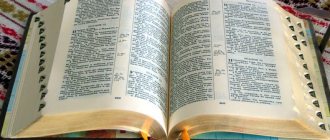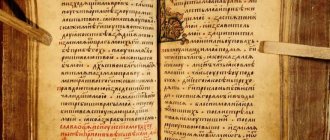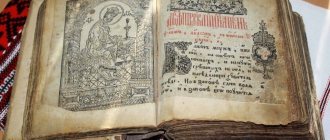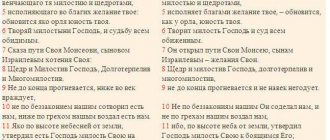Psalms, Psalm 112
112 The entire series of subsequent psalms, starting from 112 and ending with 116, represents a coherent content and disclosure of the same theme, this is God’s guidance of the Jewish people, from which the writer draws strength and confidence, as is his real prayer, to which he calls all the people will be heard by the Lord and He will help them in these difficult circumstances (Psalms 112 and 113), which actually happened, which is why the author’s song turns into a hymn of praise and gratitude (Psalms 114-116). The content of the psalms indicated here is very suitable for the time after the return from Babylonian captivity, when the Jews began to build the second temple and here they encountered opposition from the Samaritans, who were intriguing before the Persian court. This intrigue was discovered and exposed, and the work of building the temple and restoring Jerusalem was over. That is why the first psalms, in accordance with the circumstances of their origin, are distinguished by their petitionary content, and the second, after removing obstacles, are already grateful, i.e., the time of writing the psalms must be attributed to the era of Nehemiah’s activity.
112 With the one hundred and twelfth psalm, the Jews begin the hallel (i.e., hallelujah psalms), which embraces psalms 112-117 and was used during worship in the new moon. It was also used at the Jewish Passover supper, and was divided into two parts - the first ( Ps. 112
and
113:1-8
) at the beginning of the supper, and the second (
Ps 113:8
-
Ps 117
) at the end of it.
112 Servants of the Lord, glorify His name always and throughout all the earth (1-3). The Lord rules over all nations. From heaven, the place of His dwelling, He looks down to earth to raise the poor from the dust and make him sit with princes, to give the barren one to rejoice over her children (4-9).
112:1 Servants of the Lord, praise the name of the Lord. Only His servants, believers in Him and people who do His will are invited to honor and praise the Lord, since anyone else with their unclean lips only insults the Highest Family and is unworthy and cannot adequately praise Him.
112:4 The height of the Lord over all nations means His headship, power over the last. Nothing in the history of life of these peoples can happen without His will.
112:5-6 The special dwelling place of the Lord is heaven, which is distant from the earth at a distance immeasurable for man. As the sky is high above the earth, so immeasurably high is the Lord above all earthly things and man. However, the Lord does not leave the earth without His care; He “looks down upon the earth” in order to bestow various blessings on weak and helpless people. This is an expression of His extraordinary mercy and love.
112:7-9 The actions of divine mercy are indicated: He exalts from insignificance (“mudder”) and places with princes, gives children to the barren. Probably, here we mean not only special cases of such mercy of God shown over individual people, such as the healing of Job, the rise of David, Moses, Daniel, etc., or, for example, the resolution of the infertility of Sarah, Rachel, Anna, but this image is applicable to everything the Jewish people, at first insignificant and small in number, driven and slaughtered in Egypt, and then multiplied and became the owner of Palestine and had significant political weight in the eyes of the ancient pagan monarchies and peoples.
113 Starting from Art. 22 Psalm 9 in the Hebrew Bible begins a new psalm so that Psalm 10 of the Greek Bible in the Hebrew is numbered 11, and counting one psalm forward compared to the Greek counting LXX goes to Psalm 113. This psalm, according to the Greek counting, is 113, and according to the Hebrew counting, 114 , in the Hebrew Bible is divided into two psalms, so that, starting from v. 9. there is already Psalm 115, and Psalm 114 of the Greek Bible is already counted as 116 in the Hebrew Bible, that is, it is two psalms ahead of the count.
113 When Israel came out of Egypt, it became holy to the Lord. The sea ran before him and the mountains jumped like lambs. Let all the earth tremble before the Lord, who turns the stone into a fountain of water (1-8). Help us, Lord, so that Your name will be highly revered, so that the pagans will not laugh: where is their God? (9-10). Our God is great and omnipotent: He does whatever He wants in heaven and on earth. The idols of the pagans are only lifeless products of human hands. They do not see, do not hear, do not walk, although they have all the organs of the human body made (11-15). May the worshipers of the latter also become powerless like idols (16). But you, the house of Aaron, the house of Israel, and all who fear the Lord, trust in Him, who blesses all who fear Him (17-21). May the Lord grant mercy to us and our children, so that we may praise and bless Him during our lives (22-26).
113:1 A foreign people are the Egyptians, descended from Ham, the son of Noah, while the Jews have Shem as their ancestor.
113:2 To become a shrine of the Lord, His possession - synonymous expressions denoting that the Lord singled out the Jews from all other nations for special leadership and patronage of him, which is evidenced by the entire history of his life.
113:3 Manifestations of miraculous divine favor to the Jews - the passage along the dry bottom of the Red Sea under Moses and the passage through the Jordan under Joshua.
113:4-8 The legend of the mountains - the earthquake that accompanied the Sinai legislation: the transformation of a stone into a spring - a miraculous production of water from a stone in the desert.
113:9-10 The writer’s prayer for mercy to be sent to the Jews is zeal for the glory of the name of Jehovah. The difficult situation of the Jews at that time, the failures that befell them in organizing their lives upon their return from captivity and during the construction of the second temple, and their dependent position on foreign rulers could arouse among the pagans disdain for God, as powerless to protect and support their readers. Such a conclusion from the civil and political weakness of the people to the judgment of the weakness and powerlessness of the god of this people was common in the East, where the military successes and political power of the people are explained by the degree of strength of their national God. The pagans considered Jehovah to be the national god of the Jews.
113:12-15 The description of the powerlessness of pagan idols is very reminiscent of the same description in the letter of the prophet Jeremiah, written shortly after the onset of the Babylonian captivity. One might think that it was borrowed from the designated source.
113:16 Just as idols are helpless and powerless, so let their admirers, that is, the pagans, who now, under the writer, dominate the Jews, be powerless.
113:18 The house of Aaron, that is, the priests who came from the tribe and family of Aaron, the brother of Moses.
113:21 The Lord “blesses the small with the great,” pouring out his mercies on the whole people, on the noble and rich in them, as well as on the humble and poor. This instruction, like the words of Article 22, is a call for all Jews to unite on the basis of faith in the mercy of Jehovah for the organization of life and well-being of the entire people.
113:25-26 The writer is confident that the Lord will hear the prayer of his people and send down mercy, so that they “the living will bless Him,” that is, during their lifetime, and not in the distant future, they will see the fulfillment of His promise over themselves and will enjoy contentment and tranquility, for which they will praise the Lord.
114 This psalm in the Hebrew Bible is joined by the next LXX psalm, 115, and thus from Psalm 116 in the Greek Bible, and in the Hebrew 117, the previous count is restored one psalm forward.
114 The feeling of joy that is depicted in this and the next two (115-116) psalms shows that they were written after already receiving help from the Lord.
114 I rejoice because the Lord helps me when I cried out to Him under circumstances that oppressed me (1-4). The Lord is merciful and helps all those who are simple-minded before him (5-6). I am at peace because the Lord dried my tears and gave me during my lifetime to see the blessings He had sent down.
114:6 The Lord “preserves the simple-minded” - that is, those who simply and deeply, like children, believe in Him, or those who are helpless, like children, and therefore need protection from the outside. The Jews of that time, returning from captivity, were so simple-minded in faith and helpless as children, because they lived by faith and expectations of the fulfillment of the promises predicted by the prophets; they were also helpless, since they themselves, without any outside help and in poverty, had to begin again the structure of their land, both in political and religious, and in civil and economic relations.
114:7 Return, my soul, to your rest - the period of suffering and danger has passed, the time has come for contentment and a favorable course of life, since the Lord has “benefited.”
114:8 To walk before the face of the Lord is to serve Him with your life; in the “land of the living” in the land of the people of his people, now content and happy.
115 In great confusion from difficult circumstances, I said that man is a lie (1-2), and therefore I resorted only to Your help, Lord. What can I repay You for Your good deeds? I will offer you libations and fulfill my vows (3-5). The death of saints is dear before You. You have loosed my bonds, delivered me from destruction, for which I will praise You in the house of the Lord (6-10).
115:1-2 The writer's complaint about his contrition before the Lord serves as an indicator of his deep faith. In his “rashness” (more precisely, in a frenzy), in the difficult and embarrassing circumstances of his life, when he saw no help from anywhere, but encountered only opposition and deception from people, he said that “every person is a lie,” i.e. That is, that the hope for human help is not only deceptive, but that people even live by intentionally and consciously deceiving others. It may very well be that the writer here is making a hint about the intrigues of the Samaritans before the Persian court. This helplessness of the writer to get out of difficult circumstances on his own caused him to pray to God for help, being an expression of his faith that only the Lord is true and only in Him alone can protection be found.
115:4 The cup of salvation is the cup of thanksgiving that the Jews drank at the Passover supper (then they drank three cups: the cup of bitterness, the cup of gladness, and the cup of blessing). What is meant here is not the Easter cup of blessing, that is, not the giving of thanksgiving to the Lord before the Easter holiday, but the appointment of a special thanksgiving cup now, like the one that was drunk on Easter.
115:6 The death of His saints is precious in the sight of the Lord. The Lord values the death of the saints, sends it when it is needed, and therefore delivers the righteous from the difficult and apparently hopeless situation in which they find themselves (see Ps 114:3
). This is the meaning of this expression in the context of the speech and in parallel with Ps. 114.
This does not contradict the usual understanding that the Lord loves the righteous and cherishes them at their death, that is, after death the Lord accepts the righteous to Himself and rewards them. Here then lies a clear teaching about reward after death and the immortality of the human soul.
116 The said psalm is a continuation of the previous two, 114 and 115: there the writer thanks and praises the Lord on behalf of all the people in his prayer, which is the prayer of all Israel, but here, amazed and touched by the help given to him from the Lord, he invites all the tribes to languages, foreign peoples, take part in praising and thanking God. This invitation of the writer, this call of his to the pagans testifies to such a depth of his faith in the true Lord, such clarity of vision and understanding that the ongoing events of life clearly testify to the action of His providence in the world, that for him there was no doubt that the pagans would not recognized Him and did not understand the falsity of their gods. This period of undoubted for the writer, but uncertain in time, fulfillment of the appeal to the true God of the pagans, he wants to accelerate with his present appeal to them. Therefore, then up. Paul ( Rom 15:11
) sees here a prophecy about the conversion of the pagans.
Psalm 117 represents the Jewish people rejoicing due to the freedom they received (v. 5), liberation from enemies (10-13) and especially from the miraculous completion of the building, which was completed despite difficult circumstances (22-23). All of the above coincides with the time of the return of the Jews from Babylonian captivity and the completion of the construction of the second temple, about the consecration of which the psalm was probably written.
117 Let all classes and all Israel praise the Lord for His mercy (1-4). Out of trouble, I cried out to the Lord and He set me free. If the Lord is my protector, then whom should I fear (5-9)? All nations oppressed me, but I brought them down in the name of the Lord, to whom is my song (11-14). The voice of rejoicing is heard in the dwellings of the righteous, thanking the Lord for His judgment and salvation (15-18). Open the gates of righteousness to enter into a building completed with the favor of the Lord. Let us bless this day and celebrate it with sacrificial offerings and praises to the Lord (19-29).
117:1-4 The unknown writer of the psalm invites the entire Jewish people to confess and sing of the great mercy of God, which is spoken of in all subsequent content.
117:5 Out of distress - out of a difficult situation, meaning the Babylonian captivity.
He heard me - he took me to a spacious place, that is, to freedom from captivity, gave me the opportunity to be governed and live according to my own law.
117:8-9 The entire history of the life of the Jewish people, who tried to defend their political independence by concluding alliances with neighboring pagan peoples, showed how unsuccessful these attempts were. Bitter experience forced the Jews to admit that to strengthen their well-being it is better to rely on God than on human help or military force (“princes” are leaders).
117:10-14 The fruitfulness of such faith was justified under the present circumstances of the construction of the temple. All the nations surrounded me. It is known that the construction of the temple, in addition to the poverty of the returning Jews, was greatly hindered by the Samaritans, who presented the construction of the temple to the Persian rulers as the construction of a citadel, a fortress, with the goal of breaking away from the Persians and waging war against them. Only the preaching of the prophets, which inspired the builders, and faith in their own righteousness and protection from God supported the builders and was crowned with success. They pushed me hard so that I fell - the Jewish people, abandoned by everyone, considered themselves close to death, but the Lord saved them, both from captivity and helped in the present case of building the temple. That is why the writer says: “My strength and song is the Lord.”
117:15-17 Apparently, further the writer paints a picture of nationwide rejoicing. Voices are heard in the villages of the righteous, that is, among the Jewish people, as the only worshiper of the One and True God at that time: “The Lord miraculously saved me.” This gives me confidence that in the future I will not perish, I will maintain political and religious independence (“I will live”) in order to always praise the Lord.
117:22-24 The visible manifestation of divine assistance is revealed in the building of the temple. Even those who built it laughed at the material (“stone”) from which it was made, but the temple was still completed. It is clear that God Himself helped, and therefore we will praise the Lord on this solemn day of completion of the building. During the construction of the second temple, those who had seen and remembered the first, rich temple of Solomon, cried at the sight of the small size and poverty of the material from which the second temple was built, considering this a sign of the Jews’ rejection of the Lord, which undermined the energy of the builders. But the significance of the temple as a religious center, and therefore a political unifying point, was probably, if not clearly recognized, still felt by many, and their rejoicing at the completion of construction is understandable.
117:26 Here the procession is depicted going to the temple and chanting: “Blessed is he who comes in the name of the Lord,” to which the priests respond: “We bless.”
117:27-29 The Lord appeared to us and gave us the opportunity to complete the construction of the temple. The writer invites to solemnly celebrate this day with an abundance of sacrifices, placing the meat designated for sacrifice on the horns of the altar, as required by law, and then invites everyone to sing praises to the Lord.
Jesus Christ applies the image of a “stone” (verse 22) to Himself ( Matthew 21:42
;
Mark 12:14
;
Luke 20:17
) and other writers also refer this expression to Him (
Acts 4:11
;
1 Peter 2:7
). By a temple, the walls of which are connected by stone, we must understand the church founded on Christ, Who reconciled man with God; They also mean two natures in Jesus Christ, just as two walls of a building are united on one stone. This image can also be understood as an indication that with the coming of Christ the Old Testament found its completion in His life, teaching and suffering, a new life began, a new building was created. The psalm is educational.






